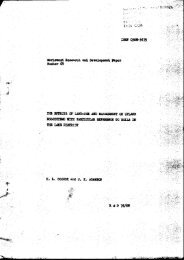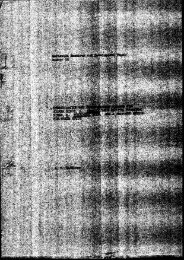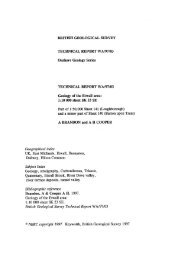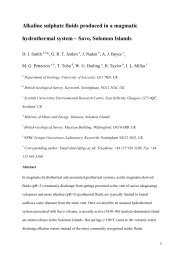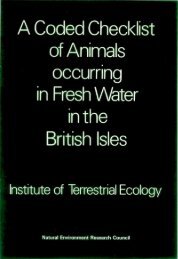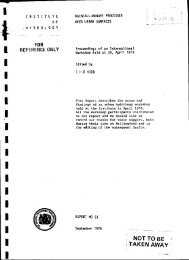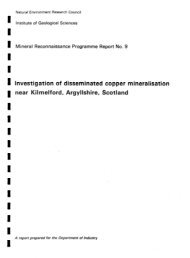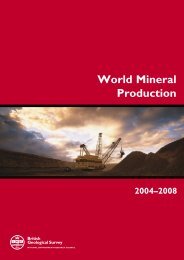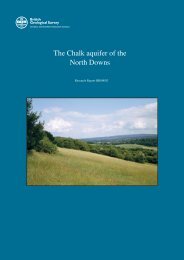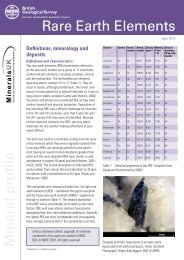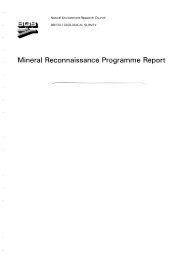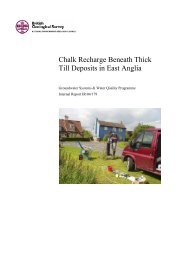You also want an ePaper? Increase the reach of your titles
YUMPU automatically turns print PDFs into web optimized ePapers that Google loves.
Platinum group metals<br />
united Kingdom summary 2000–2004<br />
Commodity 2000 2001 2002 2003 2004 2000 2001 2002 2003 2004<br />
Tonnes £ thousand<br />
Platinum group metals<br />
Imports<br />
Scrap 593 729 776 367 589 347 219 329 986 115 886 170 533 154 153<br />
Unwrought or partly worked–<br />
Platinum 36 18 10 14 48 284 668 188 045 106 075 169 110 358 887<br />
Palladium 34 20 16 48 25 331 739 257 947 80 100 245 258 98 899<br />
Other platinum group 10 6 4 9 8 147 893 90 525 38 840 30 306 67 054<br />
Exports<br />
Scrap 1 156 1 124 914 1 863 2 681 47 972 37 493 15 535 13 676 18 989<br />
Unwrought or partly worked–<br />
Platinum 32 32 44 37 44 387 533 436 159 448 364 447 735 610 972<br />
Palladium 17 23 18 28 61 218 961 339 248 148 069 117 277 286 892<br />
Other platinum group 8 6 5 10 12 128 442 115 558 47 105 51 748 126 368<br />
Potash<br />
Potash is a generic term for a variety of potassium-bearing minerals and refined products. There are many potassium-bearing minerals<br />
but only those that are water-soluble are of significant commercial interest. Sylvine (potassium chloride, KCl) is by far the most important<br />
source of potash worldwide, because of its solubility and high potassium content, and accounts for all the potash produced in the<br />
UK to date. Potassium minerals rarely occur in pure form and the mined material is invariably a physical mixture of salts. Sylvinite is a<br />
mixture of sylvine and halite (salt, NaCl) in varying proportions and this is the material that is mined in the UK. Potassium is one of the<br />
three primary nutrients essential for plant growth (the others being nitrogen and phosphorus). These nutrients form the basis of fertiliser<br />
production in the UK and throughout the world. About 90 per cent of UK potash production is consumed in the manufacture of fertilisers,<br />
with the remainder in a range of industrial applications.<br />
There is only one source of potash in the UK, the Boulby mine in the North York Moors National Park. Production of potash is thought to<br />
have declined in 2005, to an estimated 800 000 tonnes KCl, a large proportion of which was exported through the company’s deepwater<br />
terminal on the River Tees. This compares with production of 912 000 tonnes KCl in 2004. Rock salt production was 0.60 million tonnes<br />
in 2004. Salt is mined from the arterial roadways in the underlying Boulby Halite to maintain access to current potash mining areas and<br />
to explore and develop new areas for potash production.<br />
Boulby Mine is operated by Cleveland Potash Ltd, a wholly-owned subsidiary of Israel Chemicals Ltd. The parent company is the second<br />
largest potash producer in Europe and the fifth largest in the world with a total output of some five million tonnes per year.<br />
The Boulby mine employs some 800 people and is the single most important non-hydrocarbon mineral operation in Britain generating<br />
total sales approaching £100 million in 2004, including by-product rock salt. The workings extend some 14 km, reaching 5 km offshore to<br />
the north where they are approximately 750 m below the sea bed. In the south, a combination of seam dip and topographic relief takes<br />
the workings to more than 1300 m below the land surface.<br />
The potash ore is a mixture of sodium and potassium chloride crystals with occasional inclusions of insoluble material, usually clays.<br />
Returning the insoluble waste material (mainly clay) into disused mine workings was started in 2003 thereby reducing discharges into<br />
the North Sea. Infrastructure and development work for the project was part funded by a European Commission grant.<br />
united Kingdom summary 2000–2004<br />
Commodity 2000 2001 2002 2003 2004 2000 2001 2002 2003 2004<br />
Tonnes £ thousand<br />
Potassium compounds<br />
Indigenous production<br />
KCl product 966 000 882 000 900 000 1 040 000 912 000<br />
Apparent consumption (a)<br />
Potassic fertilisers<br />
(K 2O content) 404 100 393 800 339 100 388 400 392 900<br />
Imports<br />
Crude natural salts 18 050 16 154 19 366 12 751 9 204 1 235 1 053 1 141 661 400<br />
Chloride 255 572 335 398 372 031 246 164 207 056 24 824 26 679 19 462 22 023 20 808<br />
Sulphate 10 514 14 243 8 159 3 765 11 742 1 669 2 145 1 676 1 152 1 933<br />
Other potassic fertilisers 376 263 645 1 674 641 199 215 223 343 413<br />
Exports<br />
Crude natural salts 23 91 26 48 11 58 36 9 71 59<br />
Chloride (b) 630 000 530 000 440 000 630 000 512 000 ... ... ... ... ...<br />
Sulphate 1 036 264 283 153 21 318 73 102 82 12<br />
Other potassic fertilisers 107 877 457 456 641 326 360 497 395 396<br />
(a) Home deliveries plus imports. (b) BGS estimate.<br />
83



